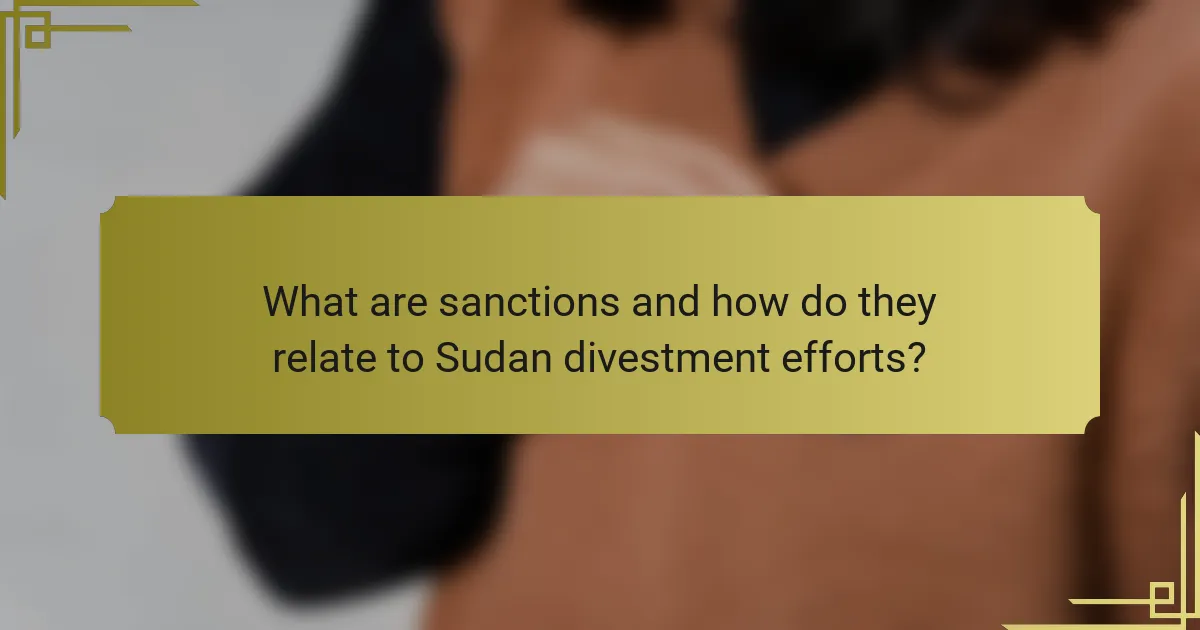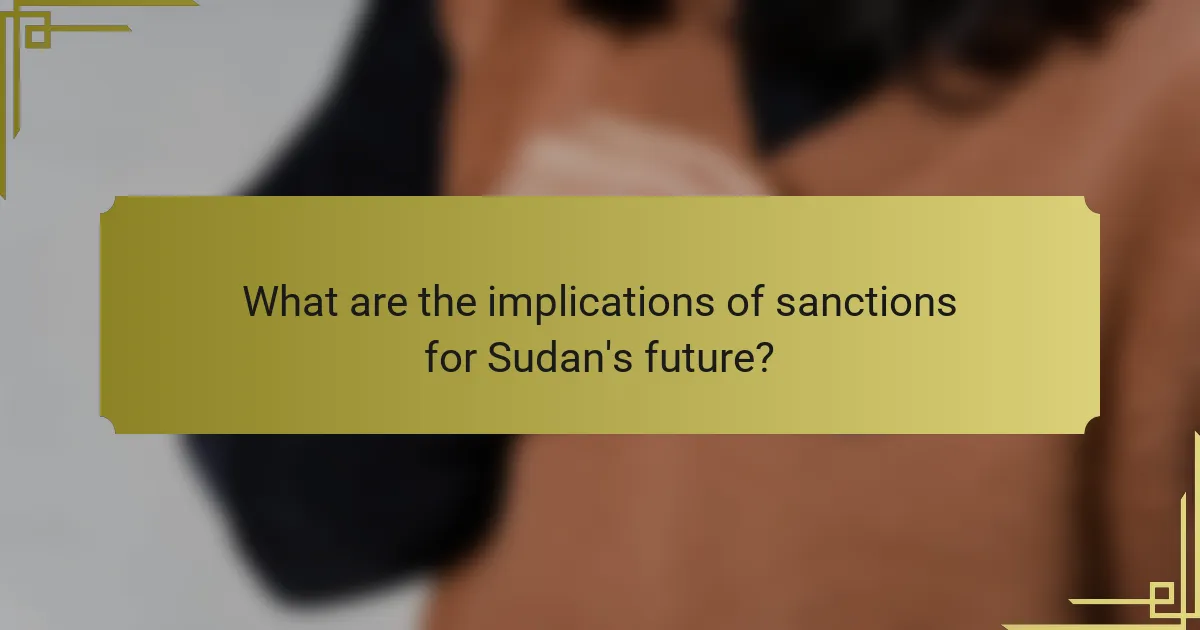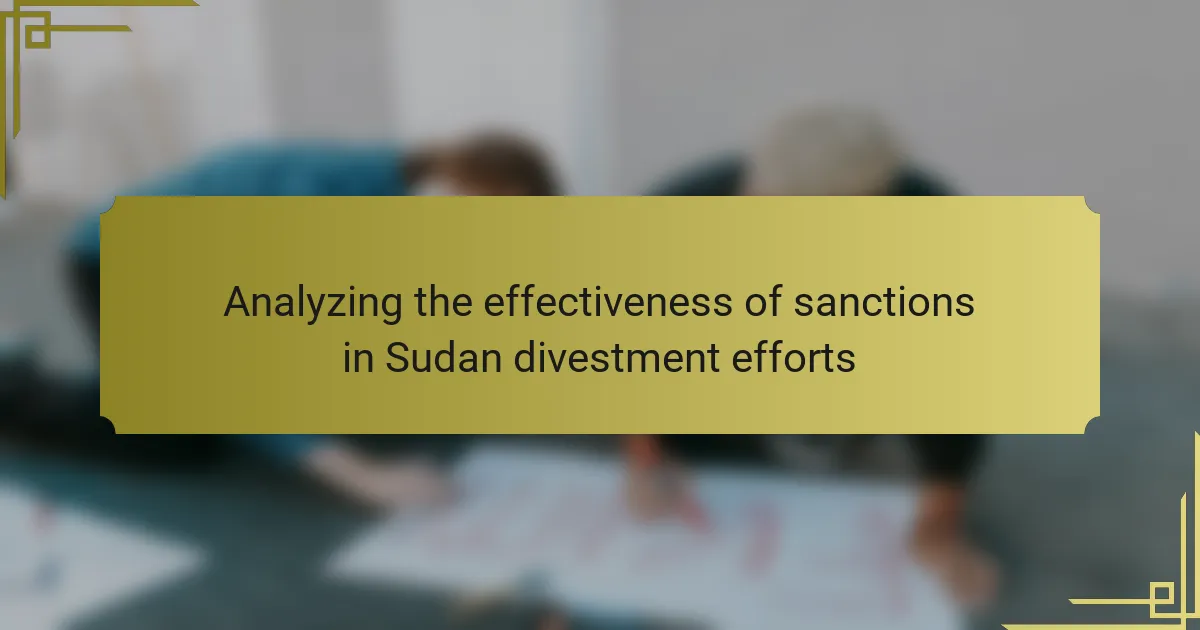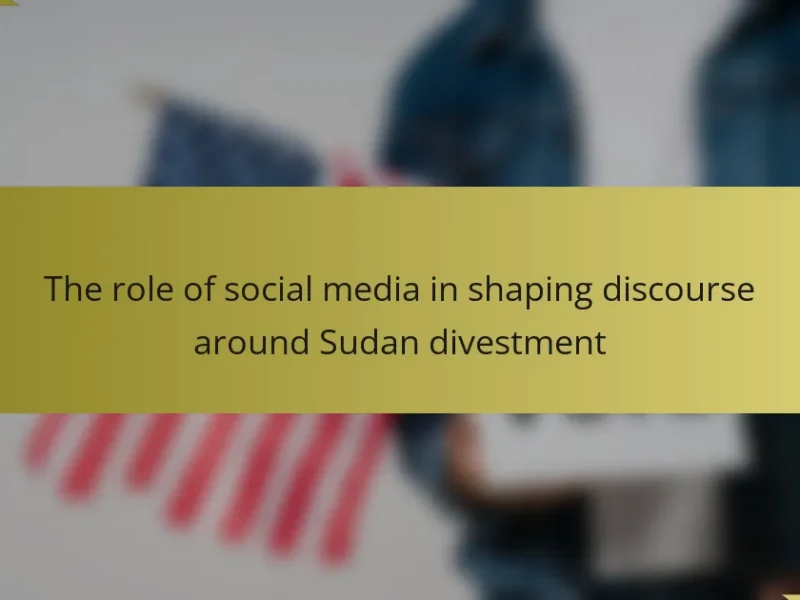Sanctions are punitive measures used by countries or international organizations to influence a nation’s behavior, often including trade restrictions, asset freezes, and travel bans. In Sudan, sanctions have been imposed primarily due to human rights violations and ongoing conflict, aiming to pressure the government to change its policies. Divestment efforts complement these sanctions by encouraging the withdrawal of investments from companies operating in Sudan, thereby amplifying economic pressure. Despite their intent to promote compliance with international norms, the effectiveness of sanctions and divestment strategies in Sudan has been mixed, with limited success in achieving significant economic change. The implications of these sanctions are expected to adversely affect Sudan’s economic growth, international relations, and social stability in the long term.

What are sanctions and how do they relate to Sudan divestment efforts?
Sanctions are punitive measures imposed by countries or international organizations to influence a nation’s behavior. They can include trade restrictions, asset freezes, and travel bans. In the context of Sudan, sanctions have been implemented due to human rights violations and conflict. These sanctions aim to pressure the Sudanese government to change its policies.
Divestment efforts in Sudan involve withdrawing investments from companies operating in the country. This strategy is often used in conjunction with sanctions to amplify economic pressure. The goal is to encourage the Sudanese government to address issues like violence and oppression.
For example, the U.S. has imposed sanctions on Sudan since the 1990s, targeting its oil sector. These measures are intended to limit revenue that could fund government abuses. Therefore, sanctions and divestment efforts are interconnected strategies aimed at promoting change in Sudan.
Why are sanctions imposed on Sudan?
Sanctions are imposed on Sudan primarily due to human rights abuses and conflict-related violence. The U.S. government and international bodies have targeted Sudan for its involvement in genocide, particularly in Darfur. These sanctions aim to pressure the Sudanese government to cease hostilities and improve its human rights record. Additionally, sanctions are a response to Sudan’s support for terrorism and violations of international law. The United Nations has also enacted sanctions to address the humanitarian crisis and promote peace in the region. These measures include asset freezes and trade restrictions. Sanctions serve as a diplomatic tool to encourage compliance with international norms.
What historical events led to the imposition of sanctions on Sudan?
The imposition of sanctions on Sudan was primarily driven by the government’s involvement in human rights violations and support for terrorism. In the 1990s, Sudan became a haven for terrorist groups. The U.S. designated Sudan as a state sponsor of terrorism in 1993. This designation was due to Sudan’s support for groups like Hamas and Al-Qaeda. Additionally, the Darfur conflict, which began in 2003, led to severe humanitarian crises. The international community responded with sanctions to pressure the Sudanese government to cease hostilities. In 2004, the United Nations imposed an arms embargo and targeted sanctions against individuals responsible for the violence. These actions were aimed at promoting peace and protecting civilians in the region.
How do sanctions aim to influence political or economic behavior in Sudan?
Sanctions aim to influence political or economic behavior in Sudan by restricting access to financial resources and trade. These measures are intended to pressure the Sudanese government to change its policies. Economic sanctions can lead to reduced foreign investment and limited access to international markets. This, in turn, affects the government’s ability to fund operations and maintain control. Political sanctions, such as travel bans, target key officials to deter oppressive actions. Historical examples show that sanctions can lead to negotiations or policy changes when sustained over time. The effectiveness of sanctions often depends on the unity of the international community in enforcing them.
What types of sanctions are utilized in Sudan divestment efforts?
Economic sanctions, arms embargoes, and targeted financial sanctions are utilized in Sudan divestment efforts. Economic sanctions restrict trade and investment in Sudan. They aim to pressure the government to change its policies. Arms embargoes prohibit the sale of weapons to Sudan. This helps to limit military capabilities. Targeted financial sanctions freeze assets of specific individuals and entities. They focus on those responsible for human rights abuses. These sanctions are designed to minimize the impact on the general population while targeting the regime. The effectiveness of these sanctions is often debated among policymakers and analysts.
What are economic sanctions and how do they affect Sudan?
Economic sanctions are restrictive measures imposed by countries or international organizations to influence a nation’s behavior. They can include trade restrictions, asset freezes, and financial limitations. In Sudan, economic sanctions have significantly impacted the economy. These sanctions have restricted access to international markets and financial systems. As a result, Sudan has faced inflation and reduced foreign investment. The sanctions have also limited the government’s ability to fund essential services. Humanitarian aid has been affected, complicating the delivery of assistance. Overall, the sanctions have contributed to economic instability and hardship for the Sudanese population.
How do diplomatic sanctions differ from economic sanctions in the context of Sudan?
Diplomatic sanctions involve restricting a country’s participation in international relations. These sanctions can include measures like reducing diplomatic ties or expelling diplomats. In contrast, economic sanctions target a country’s economy directly. They may involve trade restrictions, asset freezes, or financial penalties.
In Sudan, diplomatic sanctions have historically aimed to isolate the government from international support. For instance, the U.S. imposed diplomatic sanctions in response to human rights abuses. Economic sanctions, however, have focused on limiting Sudan’s oil exports and financial transactions.
The effectiveness of these sanctions varies. Diplomatic sanctions may hinder political engagement but do not directly affect the economy. Economic sanctions can lead to significant economic hardship but may also impact the civilian population adversely. Thus, the distinction lies in their focus: diplomatic sanctions isolate politically, while economic sanctions constrain financially.

How effective are sanctions in achieving divestment goals in Sudan?
Sanctions have shown mixed effectiveness in achieving divestment goals in Sudan. While they aim to pressure the government and promote compliance with international norms, their impact has been limited. For instance, despite sanctions, Sudan’s economy has remained resilient due to alternative trading partnerships. Additionally, some sectors have adapted by finding ways to circumvent sanctions. Reports indicate that the lack of enforcement and coordination among sanctioning countries diminishes their overall effectiveness. Thus, while sanctions can create challenges, they have not consistently led to significant divestment outcomes in Sudan.
What metrics are used to measure the effectiveness of sanctions in Sudan?
The metrics used to measure the effectiveness of sanctions in Sudan include economic indicators, political stability assessments, and human rights reports. Economic indicators assess changes in GDP, inflation rates, and trade balances. Political stability assessments evaluate the government’s response to sanctions and public sentiment. Human rights reports monitor violations and improvements in civil liberties. These metrics provide a comprehensive understanding of sanctions’ impact on Sudan’s socio-economic and political landscape.
How do we assess the economic impact of sanctions on Sudan’s economy?
To assess the economic impact of sanctions on Sudan’s economy, we analyze various economic indicators. Key indicators include GDP growth, inflation rates, and unemployment statistics. We also examine trade balances and foreign direct investment levels. Changes in these metrics can indicate the sanctions’ effects. Historical data provides context for understanding trends. Reports from institutions like the World Bank and IMF offer valuable insights. Additionally, case studies on similar sanctions can inform the analysis. This comprehensive approach allows for a nuanced understanding of the sanctions’ economic impact.
What role does international compliance play in the effectiveness of sanctions?
International compliance is crucial for the effectiveness of sanctions. Sanctions rely on widespread adherence to be impactful. When countries comply, it limits the targeted entity’s access to resources. This can weaken their economic and political power. Conversely, non-compliance undermines sanctions, allowing the targeted entity to circumvent restrictions. Historical examples show that strong international coalitions enhance sanction effectiveness. For instance, the United Nations sanctions on North Korea were more effective due to broad international support. Thus, international compliance directly influences the success of sanctions.
What challenges hinder the effectiveness of sanctions in Sudan?
The challenges that hinder the effectiveness of sanctions in Sudan include lack of enforcement, corruption, and alternative trade routes. Enforcement is often weak due to limited international cooperation. Corruption within Sudan’s government allows sanctioned entities to bypass restrictions. Additionally, Sudan has developed alternative trade routes to evade sanctions. These factors diminish the intended impact of sanctions. Historical evidence shows that despite sanctions, Sudan’s economy has shown resilience. This resilience is partly due to support from allied nations that do not enforce the sanctions.
How do loopholes in sanctions affect their implementation in Sudan?
Loopholes in sanctions undermine their effectiveness in Sudan by allowing entities to bypass restrictions. These loopholes often arise from vague language in sanction regulations. They can lead to unregulated trade in critical resources like oil and gold. Consequently, sanctioned individuals and organizations may still access international markets. This access diminishes the intended economic pressure from sanctions. Furthermore, the lack of enforcement mechanisms exacerbates the issue. Reports indicate that Sudanese authorities exploit these gaps to sustain revenue streams. Overall, loopholes significantly weaken the impact of sanctions on Sudan’s political and economic landscape.
What are the consequences of insufficient international cooperation on sanctions?
Insufficient international cooperation on sanctions can lead to reduced effectiveness in achieving intended policy goals. When countries do not align on sanctions, targeted entities may exploit loopholes. This can result in continued funding for activities that sanctions aim to hinder. For example, the lack of unified sanctions can enable countries to trade with sanctioned entities. Historical instances show that fragmented sanctions regimes often fail to exert necessary pressure. The United Nations sanctions against North Korea illustrate this, as some nations continued trade despite sanctions. Consequently, insufficient cooperation undermines the overall impact of sanctions.

What are the implications of sanctions for Sudan’s future?
Sanctions will significantly impact Sudan’s future by restricting economic growth and international relations. These measures limit access to foreign investment and aid. Consequently, Sudan’s economy may face increased inflation and unemployment rates. The sanctions can also hinder essential services like healthcare and education. Additionally, they may exacerbate existing social tensions within the country. Historical data shows that similar sanctions in other nations led to prolonged economic hardships. Thus, the implications of sanctions are likely to be detrimental to Sudan’s long-term stability and development.
How do sanctions impact the humanitarian situation in Sudan?
Sanctions significantly worsen the humanitarian situation in Sudan. They restrict access to essential goods and services. This includes food, medicine, and clean water. As a result, malnutrition rates rise among vulnerable populations. The economy suffers due to limited trade opportunities. Humanitarian organizations face challenges in delivering aid. Sanctions can also lead to increased poverty and displacement. Reports from the United Nations highlight these adverse effects on civilians.
What are the unintended consequences of sanctions on the civilian population?
Sanctions on the civilian population often lead to significant unintended consequences. These consequences include increased poverty levels and reduced access to essential goods. For instance, sanctions can disrupt food supplies, leading to malnutrition among vulnerable groups. Health care systems may also suffer, as medical supplies become scarce. Additionally, sanctions can stifle economic opportunities, resulting in higher unemployment rates. Social unrest may increase as citizens protest against their deteriorating conditions. Historical examples show that sanctions can exacerbate humanitarian crises, causing suffering among innocent civilians. In Sudan, such sanctions have often failed to achieve political change while harming the population.
How can sanctions lead to further political instability in Sudan?
Sanctions can lead to further political instability in Sudan by exacerbating economic hardships. Economic sanctions limit access to essential goods and services. This creates widespread poverty and dissatisfaction among the population. Discontent can fuel protests and civil unrest. The government may respond with repression, further destabilizing the political landscape. Additionally, sanctions can weaken state institutions, making governance more challenging. A weakened state is less capable of maintaining order and providing public services. This cycle of instability can perpetuate violence and conflict within the country.
What strategies can enhance the effectiveness of sanctions in Sudan?
Targeted sanctions can enhance the effectiveness of sanctions in Sudan. These sanctions should focus on specific individuals and entities involved in human rights abuses. By limiting access to financial resources, targeted sanctions can disrupt operations of those responsible for violence. Additionally, comprehensive monitoring and enforcement mechanisms are essential. This ensures compliance and accountability among those affected by sanctions. Engaging regional partners can also strengthen the impact of sanctions. Collaboration with neighboring countries can prevent sanctions evasion. Furthermore, clear communication of the objectives of sanctions can increase their legitimacy. When the goals are transparent, it fosters international support and cooperation. Finally, providing humanitarian exemptions can mitigate negative impacts on the civilian population. This approach balances the need for pressure while addressing humanitarian concerns.
How can targeted sanctions be designed to minimize humanitarian impacts?
Targeted sanctions can be designed to minimize humanitarian impacts by carefully identifying and isolating individuals or entities responsible for harmful actions. This approach ensures that essential goods and services remain accessible to the general population. Sanctions should include exemptions for food, medicine, and humanitarian assistance to protect vulnerable groups. Additionally, clear communication regarding the scope and intent of sanctions can help mitigate unintended consequences. Implementing a monitoring mechanism can assess the impact of sanctions on humanitarian conditions. Historical examples show that well-structured targeted sanctions can reduce collateral damage while achieving political objectives. For instance, the United Nations often utilizes tailored sanctions to avoid adverse humanitarian effects in conflict zones.
What role can international organizations play in enforcing sanctions effectively?
International organizations play a crucial role in enforcing sanctions effectively. They provide a framework for coordination among member states. This coordination enhances compliance and reduces loopholes. International organizations can monitor sanctions implementation and report violations. They also facilitate communication between countries to address enforcement challenges. Historical examples include the United Nations’ sanctions on Iraq in the 1990s. These sanctions were enforced through a comprehensive monitoring system. This system included regular reporting and inspections. Such measures demonstrate how international organizations can ensure sanctions are upheld.
What best practices should be considered for future sanctions in Sudan?
Future sanctions in Sudan should prioritize targeted measures that minimize civilian harm. These sanctions should focus on specific individuals and entities responsible for human rights abuses. Historical data indicates that broad sanctions often exacerbate suffering among the general population. Therefore, a tailored approach is essential.
Additionally, sanctions should be complemented by diplomatic efforts to encourage dialogue. Engaging regional partners can enhance the effectiveness of sanctions. Monitoring and reporting mechanisms are crucial for assessing the impact of sanctions. This ensures accountability and allows for adjustments based on the situation’s evolution.
Lastly, involving civil society in the decision-making process can provide valuable insights. This practice fosters greater legitimacy and support for sanctions. Evidence from previous sanctions regimes shows that inclusive strategies can lead to more sustainable outcomes.
How can lessons learned from past sanctions inform future efforts?
Lessons learned from past sanctions can guide future efforts by highlighting effective strategies and common pitfalls. Historical examples show that targeted sanctions often achieve better results than broad measures. For instance, the sanctions on South Africa during apartheid successfully pressured the government to change policies. In contrast, the sanctions on Iraq in the 1990s caused widespread humanitarian suffering without achieving political goals. Evaluating these outcomes allows policymakers to design sanctions that minimize collateral damage while maximizing impact. Additionally, understanding the role of international cooperation is crucial. The success of sanctions often depends on multilateral support, as seen in the case of Iran. Future efforts can benefit from these insights to create more effective and ethical sanctions.
What collaborative approaches can improve the success of sanctions in Sudan?
Collaborative approaches that can improve the success of sanctions in Sudan include multilateral coordination, engagement with regional actors, and targeted support for civil society. Multilateral coordination among international organizations enhances the enforcement of sanctions. This approach ensures unified pressure on the Sudanese government. Engagement with regional actors, such as the African Union and neighboring countries, can facilitate dialogue and promote compliance. Targeted support for civil society organizations empowers local voices and strengthens accountability. Historical instances show that coordinated efforts yield better outcomes. For example, the joint sanctions imposed by the UN and AU on Sudan in the past demonstrated increased effectiveness. These collaborative strategies can lead to a more impactful sanction regime in Sudan.
The main entity of this article is the effectiveness of sanctions in Sudan divestment efforts. The article examines how sanctions, imposed due to human rights violations and conflict, aim to influence Sudan’s political and economic behavior. It explores the historical context of these sanctions, the types utilized, and their impact on the economy and humanitarian situation. Additionally, the article analyzes the challenges and loopholes that hinder the effectiveness of sanctions, metrics for assessing their impact, and strategies for enhancing their success while minimizing harm to civilians.


